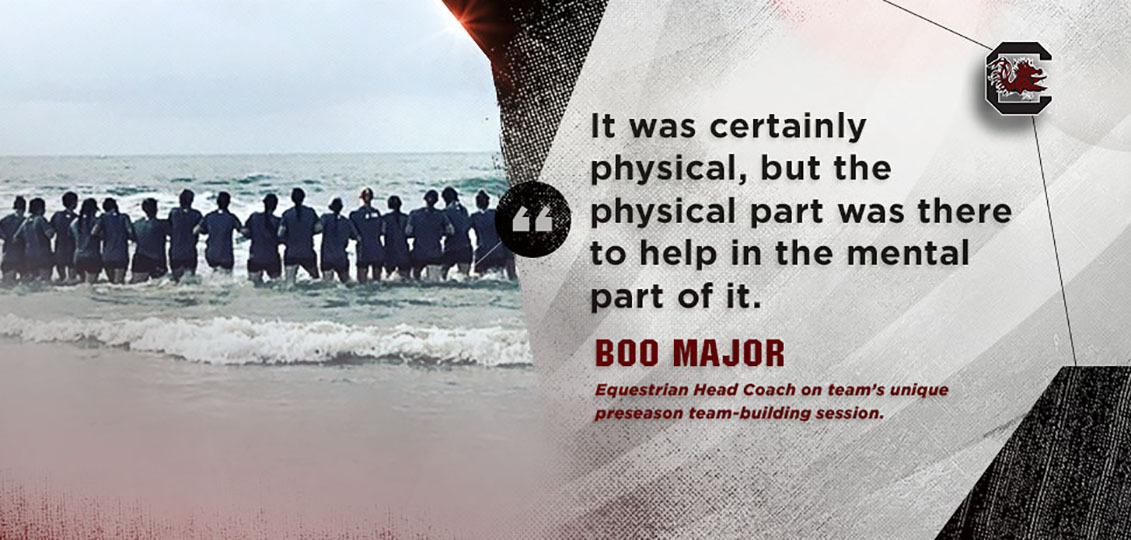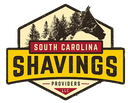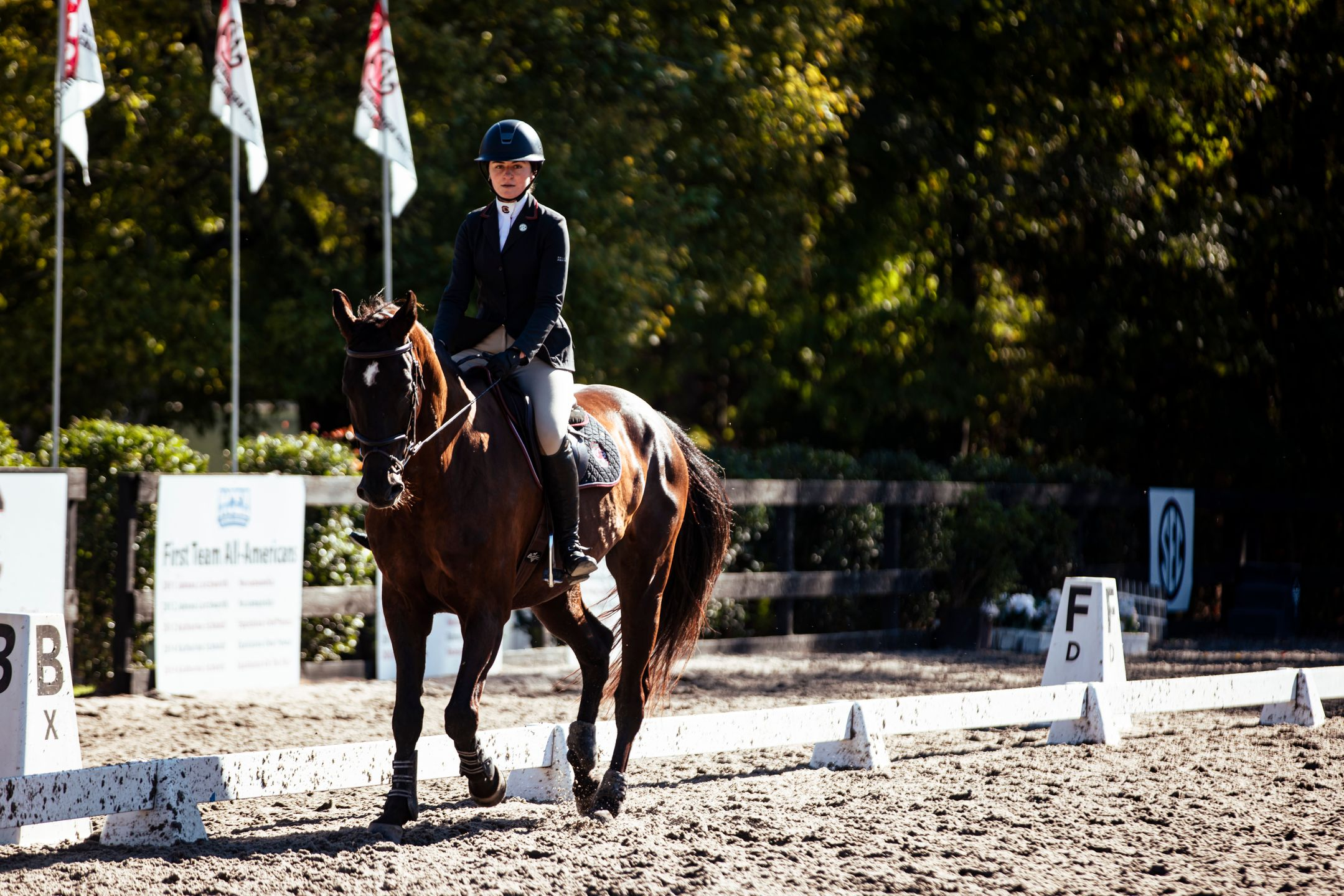
Unique Team-Bonding Preps Equestrian Team for Season
Sept. 21, 2017

South Carolina equestrian coach Boo Major told her team they were going to the beach in Charleston for some team preseason bonding. Major has a sense of humor. The bonding session at the beach back on August 26 didn’t mean playing in the surf, building sandcastles, and cooking out. Instead, there were three fitness professionals on the scene to greet the Gamecocks and take them through a rigorous series of exercises similar to what you might see in a military training film.

“She told us we were going to the beach, prepare to get wet, and prepare to work hard,” said junior Sarah Isgett. “We were all a little nervous when we first saw these guys, but we couldn’t talk. We just exchanged glances. It was very intimidating, but they did make it fun. They weren’t there to scare us by any means. They told us it would be rough, but it was for our benefit. They told us that Georgia and Auburn probably weren’t doing this, so we were going to be so much stronger as a team coming out of this.”
“It was a little intimidating, but you’re there so you just have to ‘man-up’ and do it,” senior Paisley Roberts said. “You’re there with your team, and you know you’re all going to do it together. We got off the bus, and they got us into a line. There was no talking and no smiling. From there we went to the beach, lined up and did a lot of drills and team activities. It was physical, but there were a ton of mental drills as well. I think our team was in a different spot at the end of it for sure.”
Major and her staff had talked about trying to do something different with their preseason team-building this year, and the team’s barn manager, Maggie Barton, mentioned that she knew some individuals that owned a fitness company who could offer a unique experience. Riley and Shannon Phelps and Jeremey Feldman took charge of the team and went to work.
“It was very interesting,” Major said. “We knew what was coming, but [the student-athletes] didn’t. It was something very different than what we had done in the past. I think it had a lot more meaning to it. It wasn’t a touch-feely thing where we went and ate sandwiches, watched a movie or got a pedicure. It was certainly physical, but the physical part was there to help in the mental part of it.”
“In the past, we’ve done some tree-top courses,” Roberts said. “This was on the beach, so we thought it couldn’t be too bad, but it was like a Navy Seal boot camp, so it was a little bit shocking. I don’t think any of us had experienced anything like that before.”
It really brought us together as a team.
Sarah Isgett, junior
The instructors didn’t waste any time, and the student-athletes went right to work.
“We had to do a thing called a ‘sugar cookie,'” Isgett said. “We had to sprint into the ocean, and we had to be completely submerged. Then we had to run back to the shore, roll around in the sand so it was all over us – head to toe. Then we had to get back in line, and if someone wasn’t sandy enough, we had to do it all over again. It was rough, but it got us to where we all had to hold each other accountable. We realized that we were a team, and that this was what we were here to do.”
“I wear contacts, and there was a point where we had to sit where the waves break,” Roberts said. “We were all linked together as a team, and we had to do sit-ups. It doesn’t seem that hard, but when you’re being pushed by the waves, you really have to be locked together. Every time you go back, you go under water, so you have to close your eyes. My contacts were burning!”
“It was neat because at the beginning, our lines were a little crooked, and we would not be in sync, but by the end, it was like clockwork,” Isgett added. “We were in line, and we were straight and perfect.”
The coaching staff wasn’t immune to being held to a high standard when it comes to working as a team.
“The coaches were supposed to bring sandbags, but they forgot, so while we were doing all of our drills, the coaches all had to come out in front of us and plank for two minutes, and then they had to do a sugar cookie,” Isgett laughed. “They were fully clothed and ran around in the sand. That was really cool because it made us feel like the coaches weren’t above us at that moment, and we were all a team. They have expectations out of us, and we can also hold them to a certain standard as well. So they took accountability, too.”
The instructors also provided some opportunities for the team to take in what they were doing and understand why it was being done.
“We were lined up at one point, and the instructors would just tell us to hug the person in front of you,” Isgett said. “They wanted us to tell each other how good of a job each of us was doing. I think this kept us from feeling totally defeated halfway through it. It was a really good bonding time for all of us.”

“With the physical stuff, you got to the point where you didn’t really think about it,” Roberts said. “You just kept moving forward for your team.”
By the end of the day, the Gamecocks were wet, sandy, and tired. There was also sense of satisfaction.
“We got a lot out of it,” Roberts said. “It was four or five hours, and from start to finish I thought we became a different team. The mental exercise of it was huge. We had to work together. I think it will start us off right for the season. After this, I feel like I can do anything. I was really sore and have some battle scars on my knees. There is nothing they can ask us to do now that I don’t think we could achieve.”
“It really brought us together as a team,” Isgett said. “It was definitely very physically and mentally challenging. It really showed us our weak spots, particularly in communication. Throughout this, we really had to communicate and figure things out. We would split up into teams, and we realized that when one team won, it was because we didn’t communicate throughout the process. When we really focus and come together as a team, we can really do anything we set our minds to.”
The instructors also did a good job of building up the student-athletes from a confidence standpoint.
“They were very proud of us,” Roberts said. “They told us how there’s nothing that can stop us now. They made sure to tell us that no other teams were doing this, especially not an equestrian team. They told us that we should be very proud of ourselves.”
“We did not have a single girl tap out,” Isgett said. “It was nonstop. It was about four and a half hours. They instilled in us that while this was rough, it was going to make us so much better as a team. That was really cool.”
Major hasn’t ruled out doing something similar in the future, and the student-athletes feel they’re better for having one through it.
“I really liked being finished with all of it,” Roberts laughed. “Afterwards, it was really nice to take a moment and reflect on it and what you went through. Then I felt really proud.”
“Next time, we’ll remember the sand bags,” Major joked. “Certainly what we wanted them to get out of it is that they are mentally stronger than they think they are, and physically stronger than they think they are. Sometimes equestrian athletes get a bad rap. They are athletes, and they do work hard. At the end, I think their feeling was that if we could do that, then we can do anything. It was really cool.”













